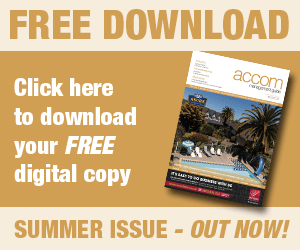Making Amenities Environmentally Friendly
- Details
- Published Date
The latest growing trend within the accommodation industry is the use of biodegradable amenities in hotels - and for good reason!
Biodegradable packaging decomposes exponentially faster than regular plastic materials, meaning that hotels and guests alike can rest easy in the knowledge that they are moving toward an environmentally friendlier future. But is everything as it seems or are purchasers being duped by advertisers?
Roland Funk, director of Swisstrade - a manufacturer in Australian amenity dispensers - is one of many industry professionals well aware of biodegradable benefits. Hotel guests, he explains, are just as concerned as hoteliers and environmentalists, about the sustainability of planet Earth. "Suppliers to the industry, as well as accommodation providers have an obligation to cater to the environmental concerns of all potential guests."
Like any consumer product there is no such thing as an eco-friendly amenity, something that James Kennedy-Grant of Health Pak Ltd asserts, but there are amenities that are more environmentally friendly than others. "Guest Amenities are like any form of consumable packaging in the marketplace and therefore the more environmentally friendly they can be made the better." Environmental benefits work their way downstream, eventually benefiting not only the hotel, but staff, visitors and each guest using the product.
Replacing hotel amenities daily has a colossal impact on the environment in the long run, from the damaging carbon output required in manufacturing and transporting the goods, to the massive amount of waste that ultimately ends up in landfills. According to Funk, the goal is evident, "either we offer our guests environmentally friendly toiletries in biodegradable packaging or our planet is going to be littered with ever larger quantities of partly used soap bars and mountains of packaging from bathroom amenities".
Concurrently, Kennedy-Grant proffered that, in the opinion of Health Pak, the future looks to improve on matters of sustainability as more and more packaging, products and programs are manufactured in a way that is becoming increasingly commonplace within the accommodation industry. To make this future an effective reality, a greater understanding of what being environmentally aware in the hotel business means. Kennedy-Grant stresses the importance of retaining quality and functionality in the product as well as biodegradability, "the product, whether soap or shampoo still has to be hygienic and work well or these environmental benefits mean nothing". As well as the product itself, hoteliers must look at where it is sourced, the facility in which it was made, how the product is used and in what manner the product should eventually be disposed.
The overall reaction to global warming and fears of environmental degradation has led many of New Zealand and Australia's amenity suppliers to offer product packaging that is considered to be environmentally friendly and biodegradable. These products, Funk explains, often eliminate or reduce wastage, replace plastic packaging with paper wrappings and ensure any plastic used is designed to biodegrade within a few short years, as opposed to hundreds, potentially thousands of years. "The world's scientists are working on ever more effective packaging options and formulations in order to render plastics recyclable and biodegradable," Mr Funk said.
Sadly though the current eco-guest amenity marketplace in New Zealand is very misleading and green-washing is unfortunately rife, Kennedy-Grant revealed. "Due to the high demand for more eco-friendly amenities there are a horrifying amount of products in the marketplace being sold that are completely inappropriate in the claims they make."
Consequently, the problem manifests in two ways; firstly as the product is no longer made locally, the knowledge of the raw materials within them and the packaging itself is very weak. Secondly, if a manufacturer offshore claims their product is biodegradable or eco-friendly, the company selling them will take this for granted and in turn the hotel buying them will follow suit. Many of the products seen in the marketplace today that claim to be biodegradable have ingredients that simply are not, and when many of the packaging that claims to be biodegradable or degradable is treated as post-consumer waste in New Zealand, it will make no noticeable difference and will never work. The only way this current trend will change according to Kennedy-Grant, is for hoteliers to take a greater responsibility and question the products they buy; refusing to simply accept advertisers' claims.
"There are international standards for biodegradability and there are a number of raw material suppliers that state that they can make additives to put into plastic bottles or other forms of packaging that make them degrade/biodegrade, but almost all these have not been physically tested in New Zealand and Australian landfill conditions to a level that local Governments have said they actually work." So when accommodation providers are looking to invest in quality sustainable goods, they need to ensure they select suppliers that will explain how the product works and the pros and cons of each option - whether it be recyclable materials, degradable items or biodegradable amenities.
Hotels making purchases from environmentally conscious suppliers thus need to search beyond the product and look into the circumstances of its manufacturing; what recognized standards does it meet, are these recognized in New Zealand as optimum environmentally-friendly conditions and is the purchaser able to ensure the product is disposed of in the way it was intended to be? It is for noble reasons that biodegradable amenities are on the rise as one of the industry's growing trends but it's up to individuals to ensure those reasons don't become corrupted.
Rosie Clarke


